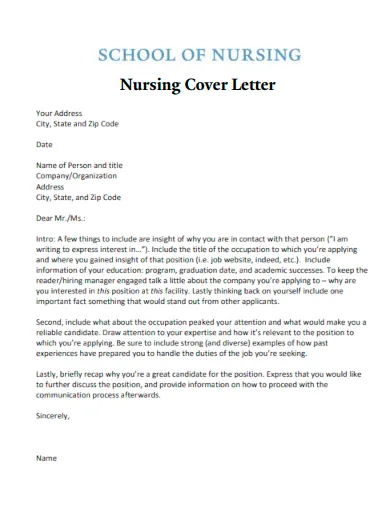What Is a Nursing Student Cover Letter?
A nursing student cover letter is a crucial document that accompanies your resume when applying for nursing-related opportunities, such as clinical placements, internships, or entry-level nursing positions. It serves as your personal introduction to the hiring manager or clinical placement coordinator, offering a glimpse into your personality, skills, and aspirations as a future nurse. Unlike a resume, which is a factual summary of your experience and qualifications, a cover letter allows you to express your enthusiasm for the role, highlight your relevant experiences, and explain why you are the ideal candidate. It’s your opportunity to make a strong first impression and differentiate yourself from other applicants. Think of it as a narrative, telling a story about yourself and why you are passionate about nursing.
Why a Cover Letter Is Important
In the competitive field of nursing, a well-crafted cover letter can significantly increase your chances of landing an interview or securing a placement. It demonstrates your professionalism, communication skills, and attention to detail. A cover letter allows you to personalize your application and tailor it to the specific requirements of the position or program. It also provides an opportunity to address any potential gaps in your resume, such as a lack of direct nursing experience, by emphasizing your transferable skills and eagerness to learn. Moreover, a compelling cover letter can showcase your personality and passion for nursing, helping you connect with the hiring manager on a personal level and making you a memorable candidate. Essentially, a cover letter is your chance to make a strong first impression and convince the reader that you are worth considering for the role.
Key Components of a Nursing Student Cover Letter
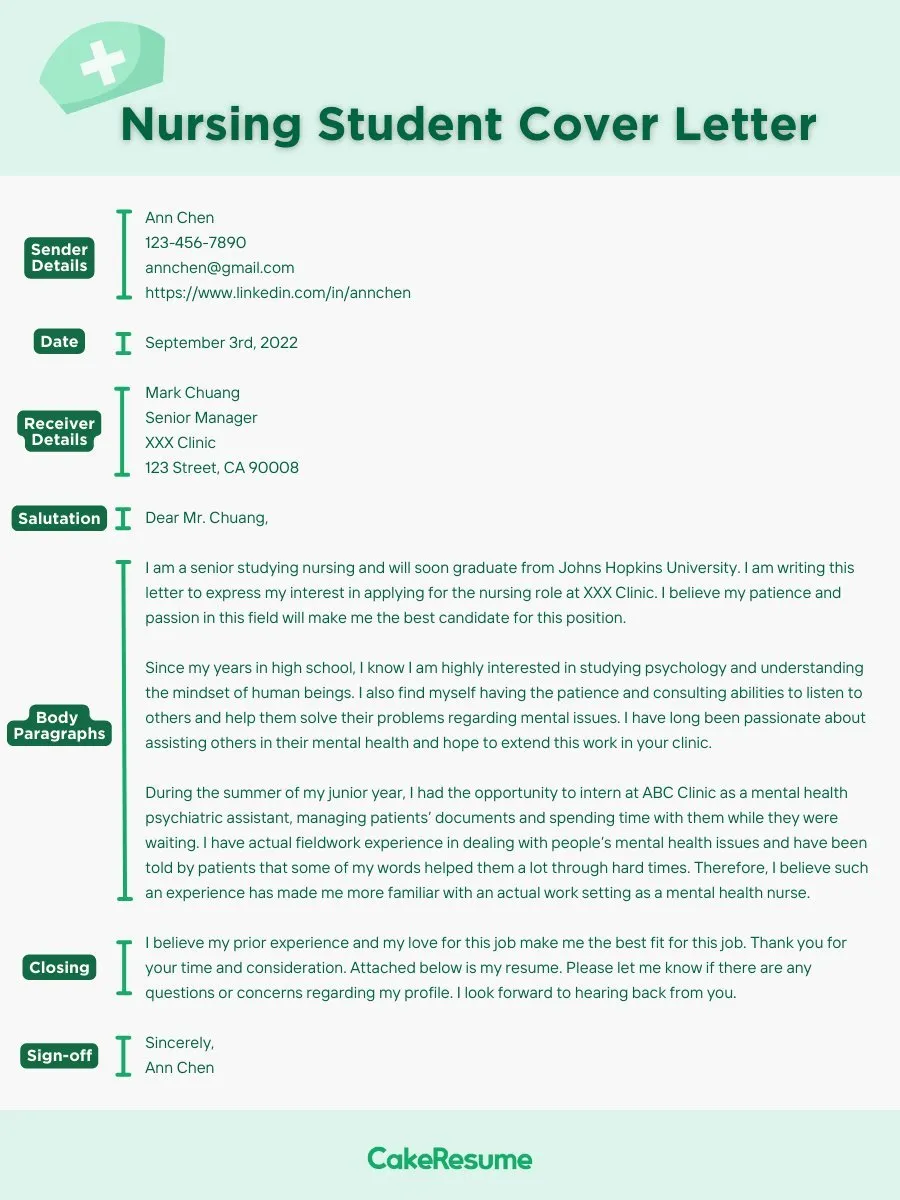
A successful nursing student cover letter follows a standard format and includes several key components. Each element contributes to the overall impact of your letter and helps you present a compelling case for your candidacy. Understanding these components is crucial for crafting a cover letter that effectively showcases your skills and experiences. Remember, the goal is to create a clear, concise, and persuasive document that captures the reader’s attention and encourages them to learn more about you. The components work together to paint a picture of you as a candidate, demonstrating your passion and suitability for the role.
Header
The header of your cover letter should include your contact information, such as your full name, phone number, email address, and mailing address. This ensures that the hiring manager can easily reach you. It is also a good practice to include the date and the recipient’s information, including their name, title, and the organization’s address. This demonstrates professionalism and attention to detail. Make sure your contact information is accurate and up-to-date to avoid any potential communication issues.
Greeting
Address the hiring manager or clinical placement coordinator by name if possible. Researching the contact person’s name shows that you have taken the initiative. If you are unable to find a specific name, use a professional greeting, such as “Dear Hiring Manager” or “Dear [Department Name] Team.” Avoid generic greetings such as “To Whom It May Concern,” as they can make your letter seem impersonal. Addressing the reader by name instantly creates a connection and shows that you have put in the effort to personalize your application.
Opening Paragraph
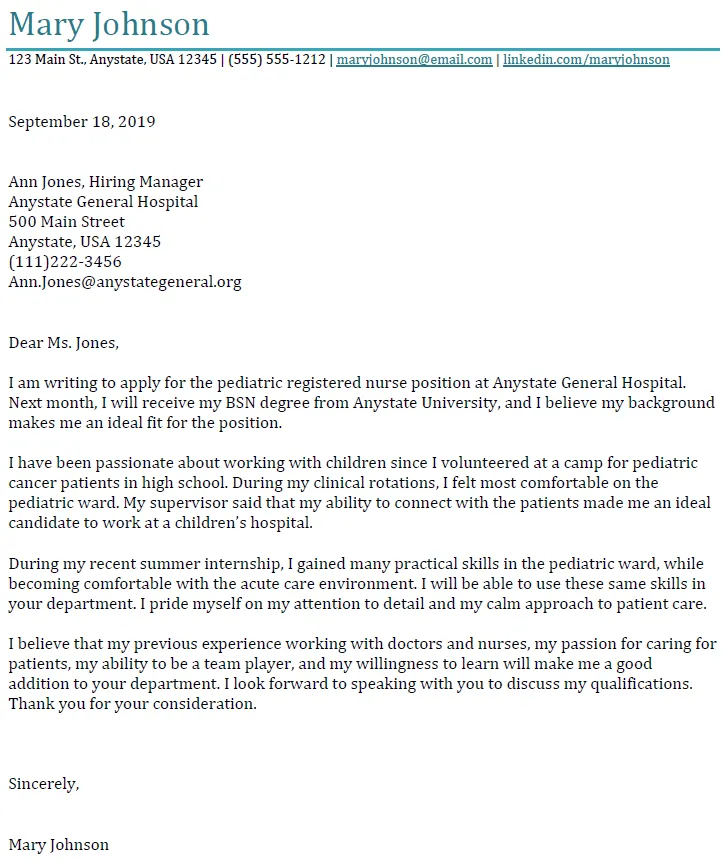
In the opening paragraph, state the purpose of your letter and the position you are applying for. Briefly mention where you saw the job posting or how you learned about the opportunity. Express your enthusiasm for the role and the organization, highlighting your interest in their mission or values. This paragraph sets the tone for your entire letter and grabs the reader’s attention. Keep it concise and engaging, aiming to make a positive first impression. Clearly state your intentions and what you are hoping to achieve by applying for the specific role.
Body Paragraphs
The body paragraphs are where you elaborate on your skills, experiences, and qualifications. Focus on highlighting the most relevant aspects of your background and how they align with the requirements of the role. Use specific examples and quantifiable achievements to demonstrate your capabilities. This is your opportunity to tell your story and connect your skills to the needs of the organization. Each paragraph should focus on a key point, supported by evidence from your experiences. Use this section to show the reader why you are a good fit, and to demonstrate your passion for nursing. Remember to use strong action verbs to describe your accomplishments.
Highlight Relevant Experiences
Describe your clinical experiences, volunteer work, and any other relevant experiences that demonstrate your skills and knowledge. Provide specific examples of how you have applied your skills and made a positive impact. Quantify your achievements whenever possible (e.g., “Assisted in the care of 10 patients daily” or “Reduced patient falls by 15%”). Even if your experience is limited, focus on what you did learn and the impact that you made. This helps show you have the experience and skills the organization is looking for.
Showcase Your Skills
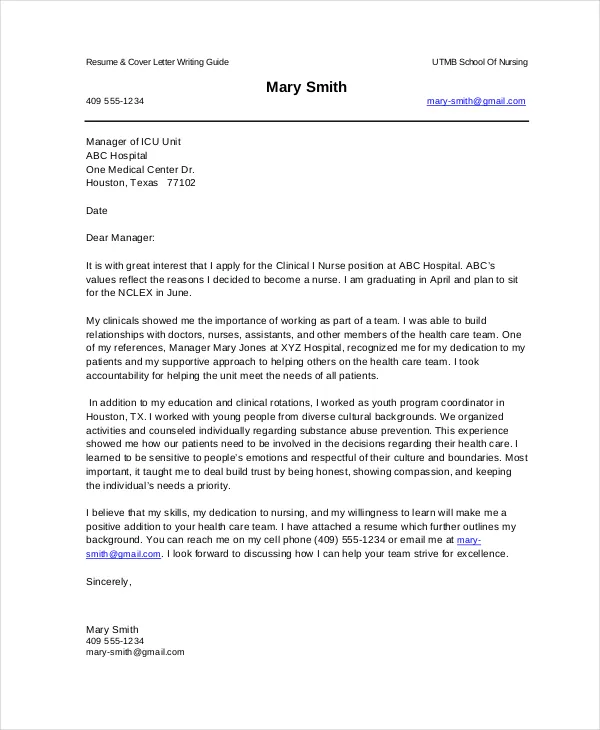
Identify the key skills that are essential for the role, such as patient care, communication, critical thinking, and teamwork. Provide examples of how you have demonstrated these skills in the past. Use the job description as a guide to identify the most important skills and tailor your examples accordingly. Show the reader, do not just tell them about your skills. Give specific examples, to support your claims. This helps showcase your practical abilities.
Express Enthusiasm
Show genuine enthusiasm for the role and the organization. Explain what excites you about the opportunity and why you believe you would be a good fit. Express your passion for nursing and your commitment to providing excellent patient care. Let your personality shine through and make it clear that you are eager to contribute to the team. Your enthusiasm can set you apart from other applicants.
Closing Paragraph
In the closing paragraph, summarize your interest in the position and reiterate your qualifications. Thank the hiring manager for their time and consideration. Express your eagerness to learn more about the opportunity and to discuss how you can contribute to their organization. Your closing paragraph should be professional, confident, and leave a lasting positive impression.
Call to Action
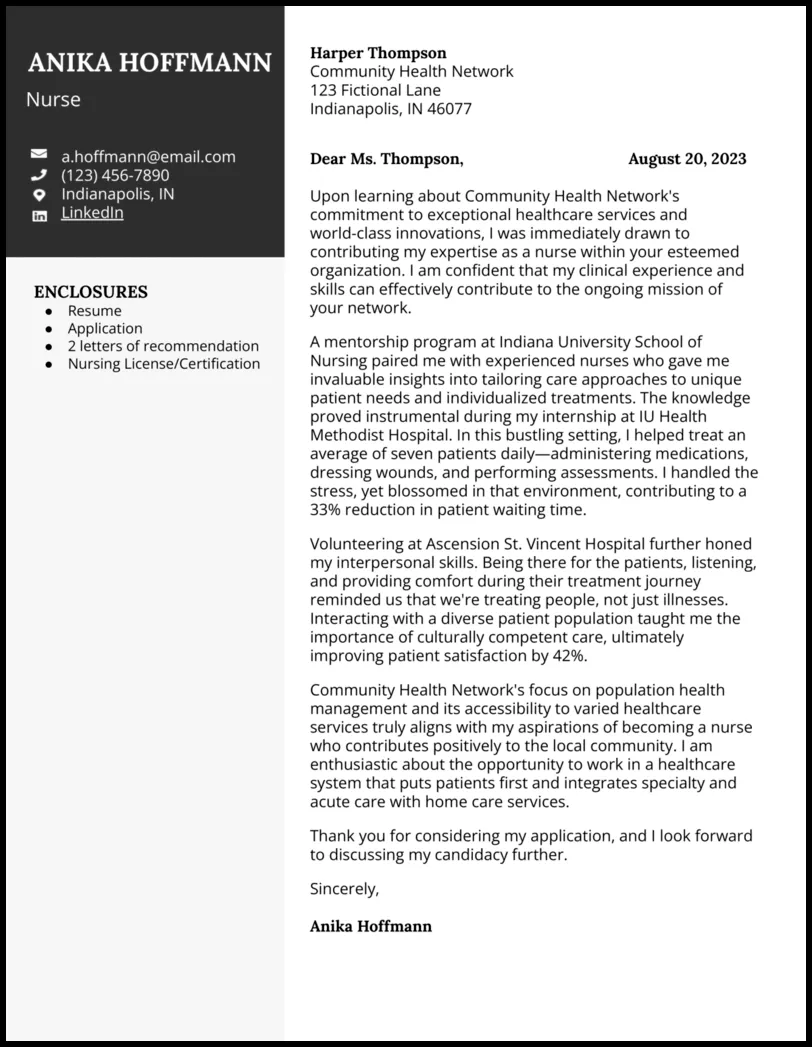
Include a call to action, such as stating that you are available for an interview and providing your contact information again. This makes it easy for the hiring manager to take the next step and contact you. Make sure to follow up if you do not hear back within the specified timeframe (if one is provided). A clear call to action encourages the hiring manager to act.
Formatting Your Nursing Student Cover Letter
Proper formatting is essential for creating a professional and easy-to-read cover letter. Poor formatting can distract the reader and detract from the content of your letter. Paying attention to formatting details can improve the overall readability of your cover letter, and demonstrate your attention to detail. Always remember to check the organization’s guidelines for formatting preferences, if available. Consistency is key.
Font and Font Size
Choose a professional and readable font, such as Times New Roman, Arial, or Calibri. Use a font size of 11 or 12 points. Avoid using overly decorative or unusual fonts, as they can be difficult to read. Maintain consistency throughout the document. A clear and concise font makes your letter easier to read, making the information more accessible to the reader.
Margins and Spacing
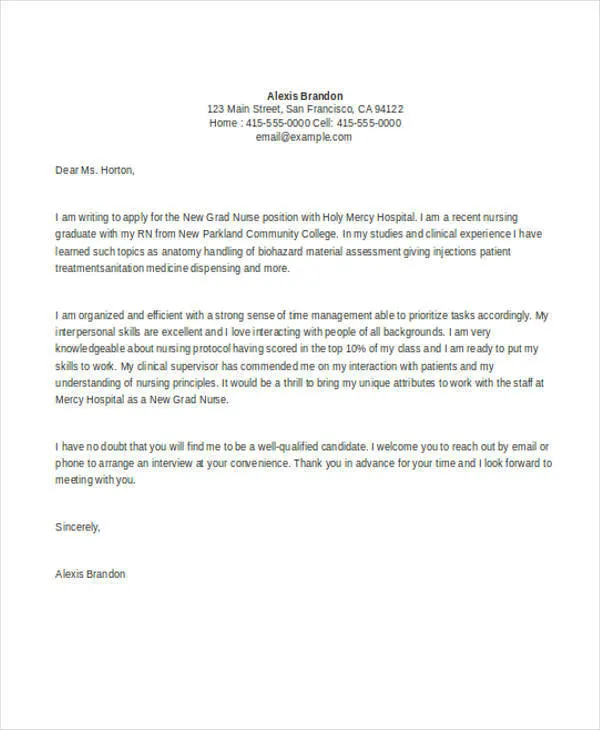
Use standard 1-inch margins on all sides of the document. Use single-spacing within paragraphs and double-spacing between paragraphs. This creates a clean and organized appearance. Ensure the spacing is consistent throughout your cover letter. Good formatting enhances readability, making your letter more approachable for the reader.
Proofreading
Proofread your cover letter carefully for any typos, grammatical errors, or spelling mistakes. Errors can damage your credibility. Read your letter aloud to catch any awkward phrasing or unclear sentences. Ask a friend, family member, or career counselor to review your letter for feedback. Attention to detail is critical in nursing, so demonstrating this through your cover letter is essential.
Nursing Student Cover Letter Samples
Reviewing cover letter samples can provide you with valuable insights and guidance as you write your own. Samples can help you understand the structure, tone, and content of a successful cover letter. They also give you ideas for how to articulate your skills, experiences, and passion for nursing. However, it is important to tailor any sample you use to your own unique circumstances and experiences, and not just copy and paste the text.
Sample Cover Letter for Clinical Placement
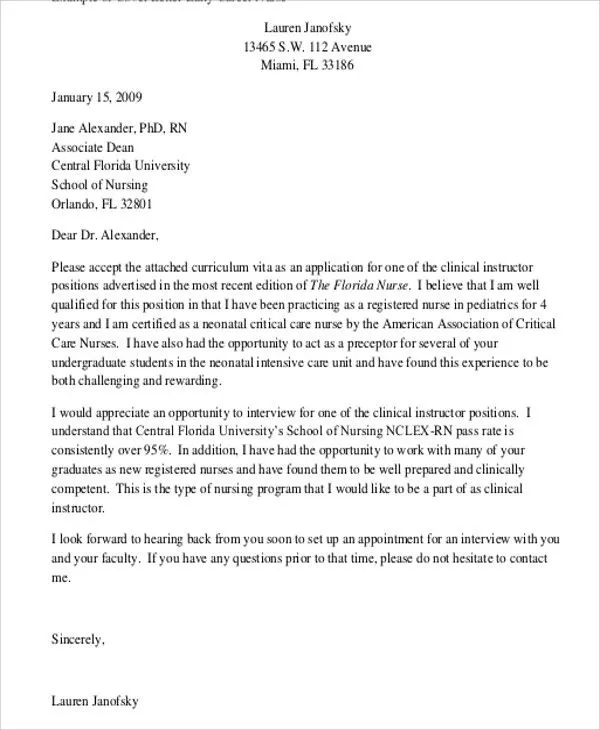
A cover letter for a clinical placement should highlight your clinical skills, patient care experience, and any specific areas of interest within nursing. It should express your enthusiasm for learning and your commitment to providing compassionate care. Tailor your letter to the specific clinical setting and the types of patients you will be working with. This shows the reader you are prepared for the specific role.
Sample Cover Letter for Nursing Internship
A nursing internship cover letter should emphasize your skills, relevant coursework, and any experiences you have had in a healthcare setting. Highlight your willingness to learn and your ability to work as part of a team. Express your interest in the specific internship program and what you hope to gain from the experience. Emphasize how your internship aligns with your long-term career goals. Tailoring your letter to the internship shows your genuine interest.
Sample Cover Letter for New Grad Nurse
A cover letter for a new graduate nurse should focus on your academic achievements, clinical experiences, and any leadership roles you held during your nursing education. Highlight your skills and knowledge, and express your readiness to transition into a professional nursing role. Tailor your letter to the specific job requirements and the values of the healthcare organization. This is a crucial opportunity to highlight your readiness for the nursing profession.
Tips for Writing a Compelling Cover Letter
In addition to the key components, consider these additional tips to make your cover letter stand out. These tips will help you create a compelling cover letter that captures the reader’s attention and makes you a memorable candidate. Implementing these suggestions will help you make a positive impression, and to demonstrate your dedication to the role, and to the nursing profession in general. The following tips can help you craft a truly remarkable cover letter.
Tailor Your Letter to the Specific Job
Customize your cover letter for each job or opportunity you apply for. Review the job description carefully and highlight the skills and experiences that are most relevant. Research the organization and address their specific needs and values. Avoid using a generic cover letter template; personalize each letter to show your genuine interest in the role and the organization. This demonstrates that you have taken the time and effort to understand the specific requirements of the role.
Use Action Verbs
Use strong action verbs to describe your accomplishments and responsibilities. This makes your letter more dynamic and engaging. Start each bullet point or sentence with an action verb to create a sense of energy and accomplishment. Examples include “Assisted,” “Managed,” “Implemented,” “Collaborated,” “Trained,” and “Educated.” Action verbs help to showcase your accomplishments.
Keep It Concise
Keep your cover letter concise and to the point. Aim for one page in length, and avoid including unnecessary information. Focus on the most important details and tailor your letter to the specific job requirements. Hiring managers are busy, so it is important to communicate your message clearly and efficiently. Focus on the most relevant and impactful information.
Show, Don’t Just Tell
Instead of simply stating your skills and qualifications, provide specific examples and anecdotes to illustrate them. This makes your claims more credible and memorable. Describe situations where you used your skills to achieve positive outcomes. Use the STAR method (Situation, Task, Action, Result) to structure your examples. This provides context and helps the reader understand how you apply your skills in practical situations.
Common Mistakes to Avoid
Be aware of these common mistakes to avoid when writing your cover letter. Avoiding these common pitfalls is crucial for creating a cover letter that reflects professionalism and competence. By avoiding these mistakes, you can increase your chances of making a positive impression. Attention to detail is vital for creating a polished and professional cover letter. Always review your cover letter.
Typos and Grammatical Errors
Proofread your cover letter carefully for any typos, grammatical errors, or spelling mistakes. These errors can undermine your credibility and make you appear careless. Use spell-check and grammar-check tools, and have someone else review your letter for feedback. Thorough proofreading is essential for presenting a professional image.
Generic Cover Letters
Avoid using generic cover letters that are not tailored to the specific job or organization. Generic letters demonstrate a lack of interest and effort. Customize each letter to highlight the skills and experiences that are most relevant to the position. Research the organization and address their specific needs. Personalizing your cover letter demonstrates your genuine interest.
Focusing Solely on Yourself
While it is important to highlight your skills and experiences, do not focus solely on yourself. Show how your skills and experiences align with the organization’s needs and how you can contribute to their success. Demonstrate your understanding of the role and the organization’s mission. Address how your contributions can benefit the healthcare environment. Show that you are not just looking for a job, but are interested in being part of the organization’s success.
Final Thoughts
Writing a compelling nursing student cover letter takes time and effort, but it is an investment that can pay off in your job search. By following these guidelines, you can create a cover letter that effectively showcases your skills, experiences, and passion for nursing. Remember to tailor your letter to each opportunity, proofread carefully, and present yourself in a professional and enthusiastic manner. A well-written cover letter is a powerful tool that can significantly increase your chances of success in your nursing career. Good luck, and happy writing. Remember that the cover letter is a vital first step in your journey.
